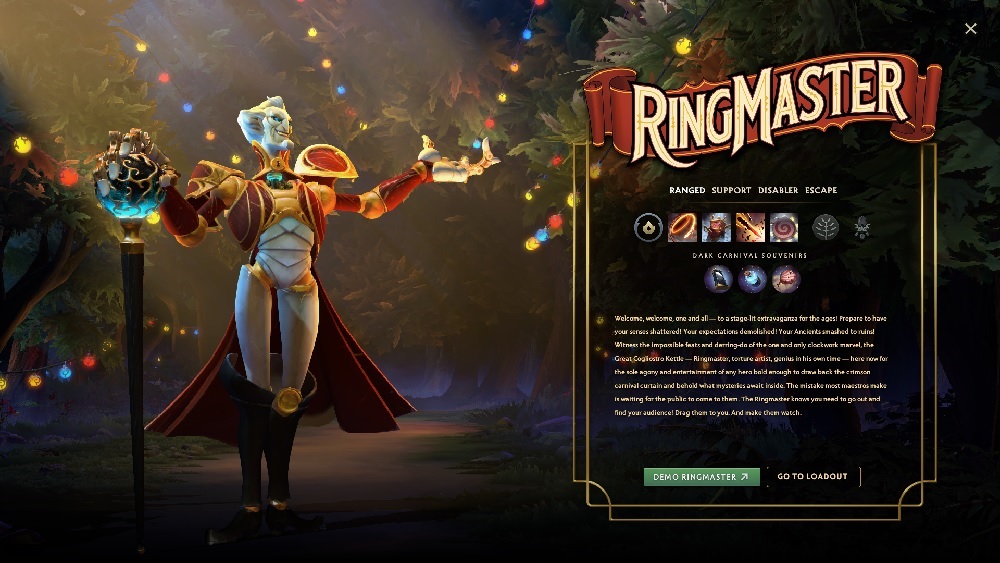Ringmaster: First Perfectly Balanced Hero

Ringmaster: First Perfectly Balanced Hero
In the grand circus that is Dota 2, we’ve seen a parade of heroes enter the arena with the subtlety of a sledgehammer. But then came Ringmaster a hero that took Valve only one year to introduce, but miraculously, didn’t arrive with a win rate that makes you question your life choices. In fact, Ringmaster’s win rate is hovering around 51%, marking the first time in recent history that a hero wasn’t immediately followed by emergency patches and player meltdowns.
Let’s talk about the elephant in the room. It took Valve an entire year to bring Ringmaster into the game. One might assume that in that time, the dev team was crafting a hero so perfectly balanced, so intricately designed, that it would redefine what it means to be a support in Dota 2. A support-intelligence hero that does its job reasonably well without overshadowing other supports or breaking the game.
To put this into perspective, it took them longer to release this hero than it took to develop entire expansions for some games. But hey, who’s counting? Certainly not the people who’ve been waiting for a new support hero since...well, forever.
Ringmaster: Master of Circuses, Mediator of Pubs
Ringmaster debuted with a win rate of about 51%, which in Dota terms is like hitting a bullseye while blindfolded. It’s the sweet spot where a hero is just strong enough to be considered viable, but not strong enough to dominate every pub and pro game for months on end. Valve, it seems, has finally mastered the art of releasing a hero that doesn’t immediately break the meta or maybe they just got lucky this time.
Remember the days when new heroes like Mars or Monkey King would drop with win rates that soared to 60%+ and left a trail of destruction in their wake? Those were the days of mass panic, where every match felt like an inevitable loss if the enemy snagged the latest OP hero. But Ringmaster? Nah, he’s more like the guy who shows up to the party, has a few drinks, and leaves without causing a scene. In the world of Dota, that’s a victory in itself.
As an intelligence hero, Ringmaster was expected to bring a certain level of cunning and complexity to the game. And to be fair, he does have a few tricks up his sleeve nothing too fancy, mind you, just enough to keep things interesting. He mostly fits into the support role, where he can help set up plays, save his carry from certain doom, and occasionally remind you why you don’t miss the days of having another overpowered carry running rampant.
In a game where intelligence heroes often either become the next mid-lane tyrant or a forgotten relic in the support pool, Ringmaster strikes a rare balance. He’s useful, but not game-breaking. Impactful, but not overwhelming. It’s almost as if Valve actually planned this—what a concept!
Is Ringmaster the Future of Hero Releases?
If Valve’s goal was to release a hero that doesn’t cause an immediate uproar or require a barrage of hotfixes, they’ve succeeded. But considering it took one year to get here, it’s hard not to wonder: did they simply run out of ways to break the game? Or maybe, just maybe, they’ve found a new approach to hero design that favors balance over chaos.
Ringmaster may not be the flashiest hero, nor will he become the subject of endless Reddit threads about being “the most broken hero ever.”
So, hats off to Valve. It took only one year to bring us a hero who’s not broken, not overpowered, and not underwhelming. At this rate, by 2026, we might even see another hero release that doesn’t make us question the very fabric of Dota 2. Until then, we’ll be here, appreciating the miracle that is a perfectly average, 51% win-rate hero.
The International
September, 11, 2025
Barclays Arena, Hamburg, Germany
Current players
Categories
- Heroes
- Items
- Game
- Players
- Tournaments
- Updates
- Rankings & MMR